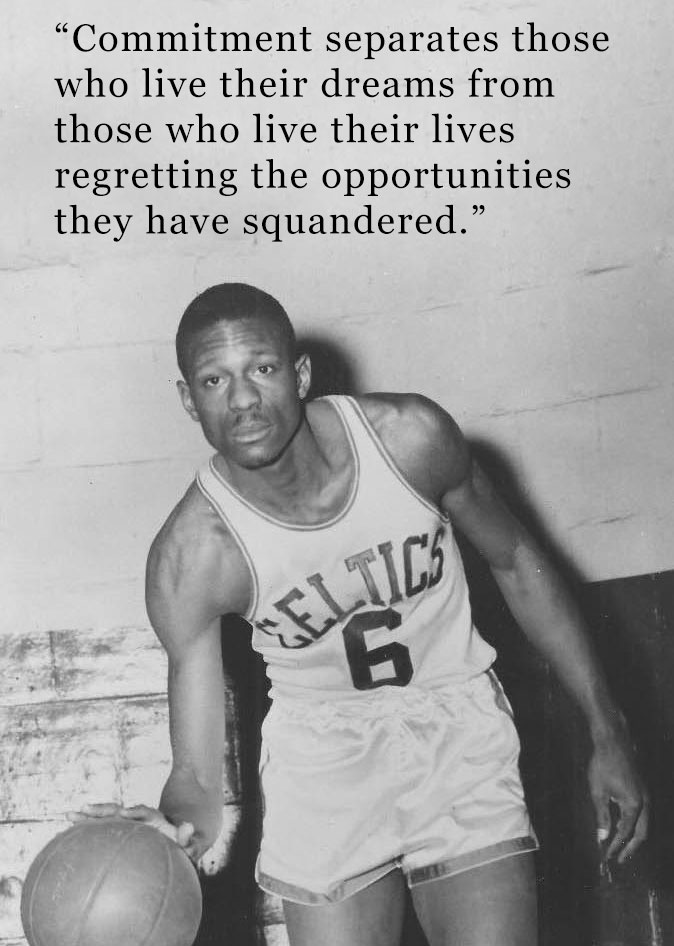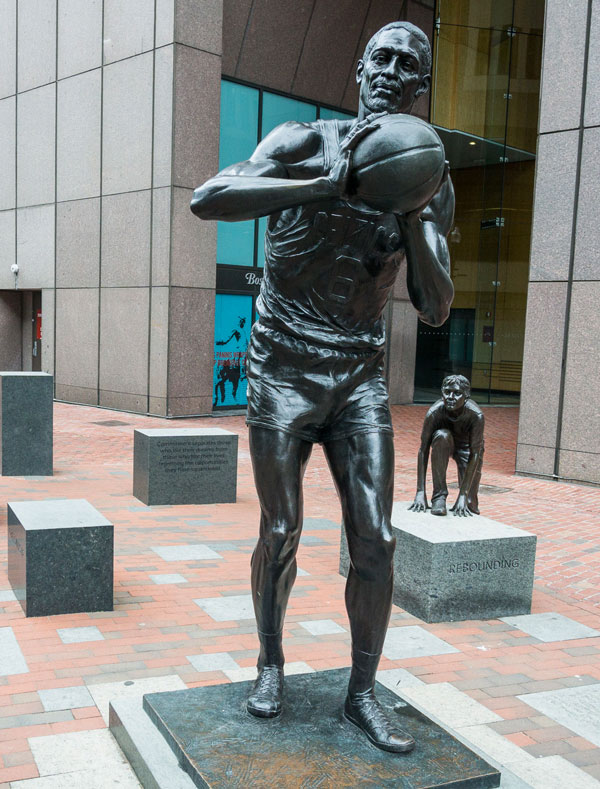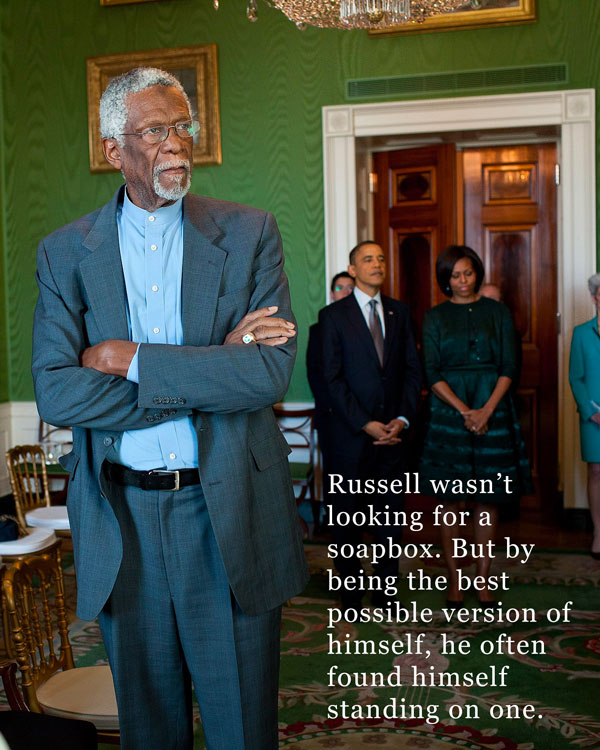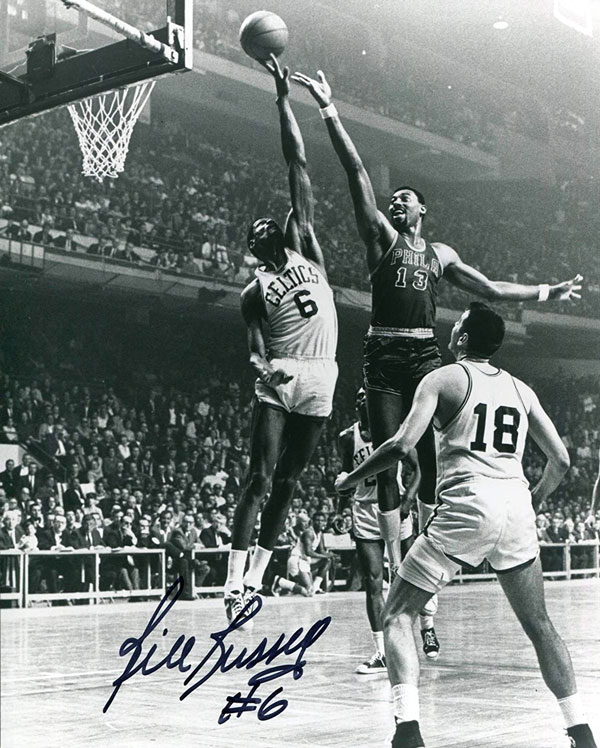Be the best you can be.
Bill Russell passed away at 88 over the weekend. We’re republishing our 2014 profile in honor of the 18-time champion.
There is an ongoing debate in sports, comparing athletes from different generations, as if a level playing field exists between them. Would the Lakers of the 70s wipe the floor with the 90s iteration? Are Larry Bird’s Celtics superior to Michael Jordan’s Bulls? These arguments generally end as deadlocked as they begin. I have one more for you. Where do the hall of fame studded Celtics teams of the 50s and 60s stack up compared to today’s competition, specifically their all-star center, Bill Russell? Some would argue their success should be adjusted for inflation.
Bill Russell won an NCAA championship, Olympic Gold Medal, and NBA title, all in one year. He went on to win eleven NBA titles in thirteen seasons, the last two as a player coach with no assistants. All told, in the twenty-one years Russell played organized basketball he won championships eighteen times.
In a recent ceremony at Boston’s City Hall Plaza, a bronze statue was erected in Russell’s honor, as much for his off-court accomplishments as his on-court achievements. Success like that lends itself easily to a blueprint for the ever-evolving man, particularly those of us in our mid-to-late twenties. This is the time we forge who and what we’ll be. Whether it’s a new job, progressing career, or pushing our way through the struggles of the everyday, we’re in that flux state, laying the bricks for the foundation of whom we’re going to be. Russell’s life and career provide a roughed out sketch of the innovation, teamwork, and integrity we’ll need to be the best possible versions of ourselves as we get where we’re going. The following is a glimpse into his life, career, and accomplishments in a way that we might try to emulate, if we’re lucky enough. Though Russell doesn’t believe in luck.
Tenacious Innovation
Bill Russell once said, “Commitment separates those who live their dreams from those who live their lives regretting the opportunities they have squandered.”
When he was drafted into the NBA, Bill Russell came into a league that measured centers solely on their offensive input. Yet Russell wasn’t an offensive center by a long shot. Points and offensive percentages alone fail to put him among the greats of his generation, forget all time. Yet he changed the game.
Russell made defense his calling card, blocking shots, not into the stands as we see so many players doing today. Russell would block the ball to a teammate or snatch it cleanly out of the air. There are no stats on this. The NBA didn’t measure blocks. Russell invented them. Before him, centers were encouraged to stay flat footed as a defensive practice. Russell went against this methodology, using instinct to create his own.
Blocked shots weren’t his only defensive contribution. Swift, mobile big men like Dwight Howard and Kevin Garnett were scarce in Russell’s playing days. In playing against bigger, bulkier centers, Russell learned to use his speed to help play defense and quickly recover back to his man. This was another innovation that was nonexistent before Russell and is now an omnipresent part of the game. Defensive rotations are commonplace in today’s game.
His defensive innovation aside, Russell was a tenacious player who would not give up. This tenacity is evidenced best in a radio call from Johnny Most:
Over to Russell. Russell edges into the lane. Russell turns. Russell shoots a short jumper. It’s no good. He gets the ball back. He fakes twice and lays it up, no good. Russell again, no good, Russell again, no good. Russell again. Russell again. It’s good. He stayed in there and he would not quit. He got five rebounds.
In each game Russell fought with determination to overcome his offensive deficiencies with perseverance and a heightened overall understanding of the game’s intricacies. And time after time Russell found a way to win. Over his college, Olympic, and professional career, he played in twenty-one win or go home games. Bill Russell never lost one.

How does this all relate to us? Think about your current job, the project that’s been stumping you in the boardroom, or the DIY undertaking you’ve been putting off in the garage. If Russell’s career shows us anything, it’s that negative statements have no place if success is the end game. Russell played against bigger, stronger opponents with more offensive skills than himself. Yet he prevailed time after time. So cut the excuses, look at things from another perspective, study the possibilities, and find another way. And remember that giving up isn’t an option. Be 21-0 in loser-goes-home games.
Cooperative Collaboration
In a conversation with Kevin Garnett during the Celtics 2008 championship run, Russell said to Garnett,
I think that you’re going to win at least two or three championships here. And if you don’t, but I see you playing the way you should play, I’ll share one of mine with you. If you play the way you play and you dedicate yourself to doing this, they will come. It’s like that field of dreams. If you build it, they will come. You may have to put your arms around a couple guys and take them with you. But you can’t drag them, you’ve got to put your arms around them and take them with you.
This quote is telling of Russell’s outlook in multiple ways, the most important being the idea of teamwork. That 2008 championship run was a classic case of stars sacrificing their individual accolades for the sake of the team. This is Russell’s mantra. More important, though, it was a classic case of the team winning out over individuals, much the same way Russell consistently beat the more physically talented Wilt Chamberlain. On the road to the ’08 title the Celtics beat the Cleveland Lebrons, before Lebron himself figured out the team idea. I’ll admit, he’s still learning it two championships in. Russell never had that problem.
In his junior year of college, Russell averaged 20 points and 20 rebounds per game, and led his 28-1 USF basketball team to a National Championship. At the end of the season he wasn’t even voted the best center in Northern California. Russell’s response hints that this lack of recognition helped form his team mentality. He stated,
Well, that let me know that if I were to accept these as the final judges of my career I would die a bitter old man. So I made a conscious decision: “What I’ll do is I will try my very best to win every game. So when my career is finished it will be a historical fact I won these games, these championships, and there’s no one’s opinion how good I am or how good other guys are or comparing things.
At the statue unveiling Russell remarked, “The most important thing to me is the friends that I’ve made. The biggest honor I got playing for the Celtics is they made me their captain. And so I have always thanked my teammates for letting me help them be champions.”

Statue of Bill Russell by Ann Hirsch
You might be asking yourself how teamwork can help you. When you’re a part of a team, you gain the ability to tackle larger scale projects by bringing in the strengths and skill sets of a variety of people. Russell played with numerous hall-of-famers. It could have been easy to get in a logjam for shots, minutes and points. But, as in any organization, some people excel at particular tasks while others showcase a different set. Rather than be a pedal to the metal jack-of-all-trades, it would behoove you, as it did Russell, to learn to work with, and adapt to, those people who share your common goal. All throughout arts and education, and in the cooperative environment business has become, the ability to collaborate is an unquestioned asset that leads to success. Proper teamwork strengthens interpersonal skills, heightens point of view, and allows for a more varied frame of reference. It also creates mutual accountability and the advantage of multiple individuals caring about the same goal. Russell embodied teamwork, and as a result became a leader. And we all want to be known as leadership material.
Responsible Integrity
Russell was a huge proponent of civil rights. It wasn’t that he actively tried to be a civil rights leader. By all accounts, Russell was a private person who wanted little to do with stirring trouble. But trouble was all around him, whether he liked it or not. Throughout his life and career, he was consistently in the midst of heated race relations. During his high school, college, and professional career, Russell was the victim of racial abuse and bigotry.
Russell benefitted from coaches who did not see race as a factor on or off the court. His high school coach, George Powles encouraged the then 5’10” Russell to play basketball and went so far as to pay the two dollars for a year’s membership for Russell to the Boy’s Club. Russell’s college coach, Phil Woolpert, integrated the University of San Francisco basketball team and was the first college coach to start three black players. Russell’s professional coach, Red Auerbach, was the first to start five black players.
The actions of these men were not made with civil rights in mind. They were basketball decisions. Russell respected that about each of them. When asked by Auerbach to be the player-coach of the Celtics, Russell accepted, later stating that if he had been asked to take the job as a civil rights statement, making him the first black coach, he’d have promptly refused. Russell accepted the offer because he believed he was the best man for the job.
Integrity can sometimes become a mythical word. You don’t need to go out looking for a cause. If you have one, all the more power to you, but it isn’t the cause that makes the man. Russell wasn’t looking for a soapbox. But by being the best possible version of himself, he often found himself standing on one.

So how can integrity specifically help you? Let’s take the office as our example. Stand behind the choices you make every day. By taking into account every aspect of each decision, you can make an educated choice and stand by it. Think of the people in your life, or organization, who do this. It may be a select few, but those few are generally respected. That is integrity in its simplest form.
Integrity is a whole lot of little things that add up. Be where you are and commit yourself, wholeheartedly, to whatever you’re doing. The byproduct of committing yourself to people and relationships, ventures and activities, if you do so sincerely, is the ability to stand by those commitments with pride. Russell said it best, “Philosophically all I’ve ever done was to try to never shame my father.”
It Doesn’t Stop When You Hang Up Your Chuck Taylor’s
Since his playing days, Russell has devoted himself to mentoring as part of the Massachusetts Mentoring Partnership. Even when a statue in his honor was proposed, Russell was against it until the project included support for his mentoring program.
One of Russell’s favorite quotes is, “There are no other people’s children in the United States. There are only next-generation Americans.” This outlook is one of the many ways Russell embodies the never say die mentality. His battle didn’t stop when he walked off the basketball court.
“All winning streaks begin with a single victory. All successful people, team, companies, experience their success by an ability to grow to move from level one to the next, never taking shortcuts, never thinking about more than what’s required to make things work right where they are.” Because when it comes down to it, “No matter where you are in life you cannot win consistently unless you are in a position to win.” Bill Russell was a winner. Better yet, Bill Russell is a winner. His impact on every facet of his life looms as large his bronze counterpart.
